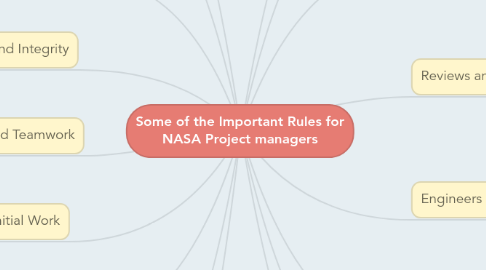Some of the Important Rules for NASA Project managers
by Sorina PLESa

1. Initial Work
1.1. Initial planning is the most vital part of a project.
2. Comunications
2.1. - good communications; The partners should know any rumor or actual changes in plan.
2.2. - talk with the right people to understand a personnel or technical problem;
2.3. - education is a must for the modern manager;
3. Hardware
3.1. Most equipment works as built, not as the designer planned. This is due to layout of the design, poor understanding on the designer's part, or poor understanding of component specifications.
4. Computers and Software
4.1. Get the basic system working first and then add the bells and whistles.
4.2. Knowledge is often revised by simulations or testing, but computer models have hidden flaws not the least of which is poor input data.
5. Senior Management, Program Offices, and Above
5.1. Know your management.
5.2. Remember the boss has the right to make decisions.
5.3. Never ask management to make a decision that you can make.
5.4. You and the Program Manager should work as a team.
6. Decision Making
6.1. Wrong decisions made early can be recovered from. Right decisions made late cannot correct them.
6.2. Sometimes the best thing to do is nothing.
6.3. Never make a decision from a cartoon.
7. Professional Ethics and Integrity
7.1. Integrity means your subordinates trust you.
8. Project Management and Teamwork
8.1. Projects require teamwork to succeed. Remember, most teams have a coach and not a boss, but the coach still has to call some of the plays.
8.2. A puzzle is hard to discern from just one piece; so don't be surprised if team members deprived of information reach the wrong conclusion.
9. Treating and Avoiding Failures
9.1. Things that fail are lessons learned for the future.
9.2. Mistakes are all right but failure is not.
9.3. History is prologue.
9.4. Experience may be fine but testing is better.
9.5. Don't be afraid to fail or you will not succeed, but always work at your skill to recover.
10. The Project manager
10.1. A project manager must to be intrest of the work of his team.
10.2. A project manager must to know what motivates the project contractors.
10.3. "solve your own darn problems, that is what we hired you to do"
11. People
11.1. - they will not accept a poor job
11.2. - a good technician, quality inspector, and straw boss are more important in obtaining a good product than all the paper and reviews;
11.3. support the person doing the work
11.4. - the value of other people's time
12. Reviews and Reports
12.1. - find a way for the reviews to work for you;
12.2. - construct a set of slides that only needs to be shuffled from presentation to presentation
12.3. - never undercut your staff in public
13. Contractors and Contracting
13.1. A project manager is not the monitor of the contractor's work but is to be the driver.
13.2. Being friendly with a contractor is fine—being a friend of a contractor is dangerous to your objectivity.
14. Engineers and Scientists
14.1. Engineers are born optimists.
14.2. The scientists will work with you if they believe you are telling them the truth.
15. Program Planning, Budgeting, and Estimating
15.1. Today one must push the state of the art, be within budget, take risks, not fail, and be on time.
15.2. All problems are solvable in time, so make sure you have enough schedule contingency.
16. The Customer
16.1. Remember who the customer is and what his objectives are.
17. NASA Management Instructions
17.1. NASA Management Instructions were written by another NASA employee like you; therefore, challenge them if they don't make sense. It is possible another NASA employee will rewrite them or waive them for you.


